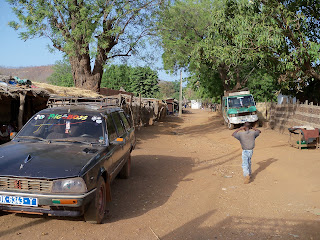One of the very first things that happened when I arrived in Senegal was that I started taking anti-malarial medication. People who grow up in areas where malaria is endemic can acquire some degree of resistance to malaria infections, but PCVs definitely don't have any sort of immunity. While there are a places in northern Senegal where malaria is practically non-existent (mosquitoes can't live without water and it's the desert up there) it exists on an epic scale down here in Kedougou, particularly during the rapidly approaching rainy season.
The go-to malaria prevention drugs in West Africa are doxycycline (doxy, as we call it)and mefloquine (AKA Mephaquin, Lariam). Doxy is an antibiotic, sometimes prescribed to people in America for acne. You have to take it every day and it has mostly mild side effects, like upsetting your stomach and making you more sensitive to the sun, but most PCVs here tolerate it well and for a few it's even helped keep their complexions clear. However, due to an allergic reaction I once had to a medication in the same -cycline family of drugs the Med Office (quite rightly) decided that it was off-limits for me and I was put on mefloquine.
Mefloquine (one of the generic versions of the much-maligned Lariam) is made of a chemical that disrupts the development of malaria parasites. It doesn't tend to upset your stomach, you only have to take it once a week, and, like doxy, it's pretty cheap. However, in some people it can cause things like extremely vivid dreams, insomnia, anxiety and/or depression. More rarely it can cause hallucinations, odd behavior, and self-destructive thoughts. My first few months on Mefloquine I had bizarre, incredibly vivid dreams (all of Peace Corps in a strange pageant at an Under-the-Sea-themed middle school formal; being menaced by lazy, helmeted urban dinosaurs, etc etc) but that was pretty much it and I didn't mind.
Then, as the weeks went by, I started getting weirder. Slowly, like the proverbial frog, I went on with my life as a tight, angsty knot began lacing itself around my sternum. Back in America I wasn't exactly an carefree ray of twenty-four-hour sunshine, but I also didn't get all squirrely about making eye contact with my neighbors. It took awhile for me to decide that the anxiety I was feeling wasn't justified (from scary transport to aggravating cat-callers, there are so many anxiety-making things here) but eventually I listened to other PCVs and gave Med call. It didn't take long for them to decide that I shouldn't be taking mefloquine anymore and (because my -cycline allergy ruled out taking doxy) they set about getting authorization from the Washington, D.C. Medical Office to switch me to Malarone.
 |
| The most valuable thing in my hut. |
They needed official permission from D.C. because Malarone costs a lot of money. The Cadillac of Chloroquine-resistant malaria prohylaxsis medications, it's known for having almost no side-effects, and also for being crazy expensive. Because it's a generic drug Mefloquine is pretty cheap (I think brand-name Lariam can be more expensive) and an entire month's worth of doxy only costs about $10 USD, but Malarone costs about $5 USD per pill, or about $185 USD per month. That's considerable, particularly at a time when budgets are getting slashed left and right. In any case, they sent me a bottle of Malarone, I stopped taking Mefloquine, and after a couple weeks the big ball of anxiety in my chest started to loosen. It took a couple more months for me to really feel like I was getting back to normal, but it happened eventually and life is much better now. There are still plenty of stressful things (student loans, rainy season transport, project funding, garage weirdos, government paperwork...) but they no longer feel like they're consuming me, and I have a new appreciation for what people who struggle with serious anxiety issues have to deal with.
Also, I was sitting in my hut the other day and realized that the bottle of Malarone I was holding probably cost about five hundred dollars, making it the most expensive thing currently in my possession, worth more than my netbook and my iPod put together.












































